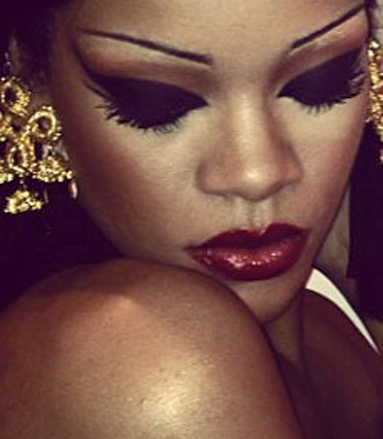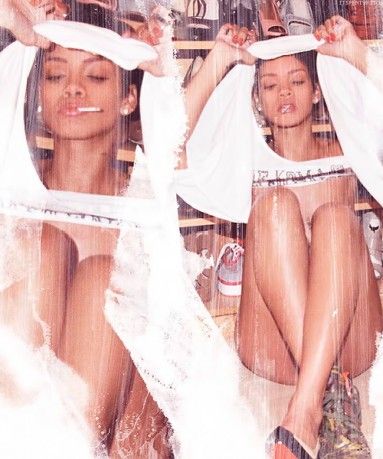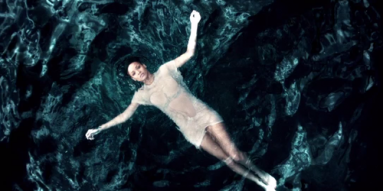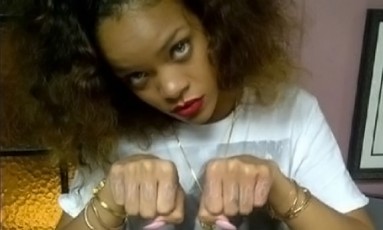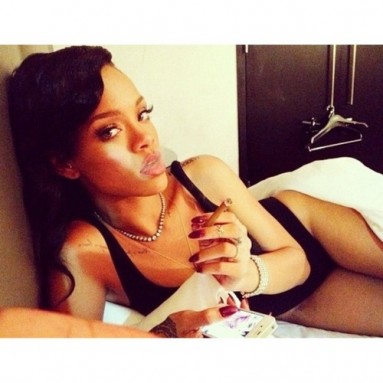Rihanna won't let us feel better about ourselves through her story, and she won't even say sorry
When Rihanna’s Unapologetic came out in November, critics and fans filtered their response to it through her continued relationship with Chris Brown, who infamously assaulted her outside the 2009 Grammy Awards ceremony. For example, the Los Angeles Times’s Randall Roberts opens his review with a discussion not of the lead single “Diamonds,” but of “Nobody’s Business,” her duet with Brown. Dan Martin’s NME review reads the album almost entirely through the lens of this collaboration, though he avoids the egregious concern-trolling present in, say, Jon Caramancia’s review in the New York Times. When he claims that “to make public art with the person who physically abused you is immature, pre-feminist, post-ethics,” he positions himself as the white person telling a supposedly primitive, infantile black woman what’s best for her.
MusicOMH’s Philip Matusavage takes the saving-brown-women-from-brown-men paternalism the furthest:
To argue that the unpleasantness at the album’s core doesn’t matter ... is to enable the misogyny which fuels this record, where an overwhelmingly male group of songwriters play up Rihanna as an alluring cipher, flirting with danger while staring into the void. Whatever Rihanna’s role in this album, it’s to be hoped that she doesn’t believe most of what she’s singing here. As a record it is not only misguided, it’s dangerous. We should not shy away from that.
These reviewers treat Rihanna as too “immature,” passive, victimized (by Brown, by her management), or uninformed (“pre-feminist”) to fully understand the implications of what she has done. Sure, she may be defiantly flipping a musical bird, as Caramancia suggests, but that’s still a very adolescent, unreflective behavior.
Critics like to paint Rihanna as a victim of Brown and the record industry because they can’t fathom why she would intentionally invest in the damage Brown symbolizes. Why continue to put personal and professional resources in to her relationship with Brown, when, at least at the professional level, she will not get a favorable return on them? Why would she cultivate an unlikable and unfashionable image, the image of a woman who returns to her abusive partner? Roberts’s review is especially revelatory. The album is, he argues,
a little sickening, because for the first time since the incident, her addressing the complicated issue feels not like a defense of love but a marketing maneuver, a way of turning a negative into a positive.
Contemporary notions of ideal femininity require women to overcome the damage patriarchy does to them: “Good” women must be resilient and bounce back from negative body image, domestic abuse, work/life double-binds, misogynist cultural traditions (veiling, polygamy), etc., turning them into “positives.” Because Unapologetic’s “positive” (profit) embraces rather than overcomes the “negative” — her relationship with Brown, which symbolizes her incompetence and/or profit-motivated self-destruction — Roberts hears it as amplifying the “wrong” affects: not “winning” and resilience, but melancholy, a refusal to get over it.
Rihanna capitalizes on damage, just not in the “right” way, i.e., in a way that amplifies listeners’ experience of privilege. The album is “sickening” because listeners cannot efficiently turn her damage — domestic abuse, poverty, racism, etc. — into their own human capital. Listeners can’t use their appreciation of the album as a way to demonstrate their status as “good” subjects, except, perhaps, by concern-trolling and treating their attempts to save this brown woman from her brown man as a badge of our own credibility as the reviewers have done.
But why should we presume that the Rihanna performed on Unapologetic is more damaged and fucked up than any of the rest of us, especially the white music critics responsible for most of the paternalist outrage directed at the album? The demand that Rihanna perform overcoming and resilience — a structure of subjectivity specific to neoliberal femininity — is actually an attempt to obscure our multiracial white supremacist patriarchy’s own damage and pathologies.
Just to clarify: I’m not arguing that Rihanna should stay pathological, that she not work through her damage. It’s just that “resilience” and “overcoming” are culturally specific models of healthy subjectivity, and it is entirely possible to be mentally and socially functional but yet deviate from these models of “health.” Nor am I arguing that we should see Rihanna as a noble victim/savage, that she should stay pathological so that white people can appropriate her pain. I’m not romanticizing her suffering. I’m trying to figure out why she might choose damage, why she picks melancholia over supposedly healthy resilience. What if Rihanna’s not the (completely) pathological one here?
***
Under neoliberalism, white supremacy has reconfigured the connection between skin color and access to white privilege. White supremacy is multiracial because it grants phenotypically nonwhite but otherwise privileged people access to white privilege, to help generate the feedback loops that strengthen it. This inclusion, however, is always conditional and always instrumental. The ultimate aim is to reinforce white supremacy.
It will also deny access to phenotypically white people who are excessively “antisocial” and melancholic. So neoliberal white supremacy uses resilience discourse to fold “model” minorities into multiracial white privilege. Rihanna’s performance on Unapologetic has generated such overwhelming disgust because its challenge to resilience discourse is also, and perhaps fundamentally, a challenge to neoliberal white supremacist patriarchy.
In multiracial white-supremacist patriarchy, blackness is not so much an “otherness machine” (as Kwame Anthony Appiah puts it) as an affective amplifier. Some styles of blackness are conditionally incorporated within white supremacy’s privileged mainstream, so they don’t generate “otherness” as efficiently as do new signifiers of racialized “terrorist” identities. For example, in the aftermath of Osama bin Laden’s execution, images of a black U.S. president were juxtaposed with those of the “Muslim” terrorist, creating an us-vs-them dichotomy in which the nationalist American “us” is represented by a Harvard-educated black man, and the “them” by a vaguely “brown” religious fundamentalist.
Blackness — middle class, cis-gendered, normatively hetero- or homosexual — is still instrumental, but it’s a different type of instrument. It “works hard/plays hard,” amplifying the intensity of whites’ affective comportments. Black culture workers are like sous chefs, making white affective economies (e.g., nationalist fervor) work more efficiently. With their “work hard/play hard” and “living life on the edge” tropes, black artists — like Ludacris on “Rest of My Life” — amplify white listeners’ affective experience of “winning” — that is, of privilege.
Resilience discourse works similarly: It actively incites images and fantasies of damage so that there’s something to overcome (sort of like how “repression” discourse actively incites what is supposedly taboo, e.g., sex). Pleasure and identity (political subjectivity) are the effects of successfully bouncing back from damage. As the infamous Dove ad campaign attests, “real” women don’t hate their bodies but love them.
The problem with Unapologetic is that it amplifies the “wrong” affects: not winning and resilience, but melancholy — a refusal to overcome, a determination to remain attached to damage that plays out to privileged listeners as a lack of intensity. For example, Caramancia describes the album as “bored,” “dull,” and “bland.” The song “Lost in Paradise,” he writes, “buzzes and hums but does not take flight” as though it does not generate enough lift to rise above the album’s affective doldrums, “sinking” instead, as Alex Macpherson writes in Fact, “into directionless drift.” In a musical economy that values the “work hard/play hard” ethos (both Ne-Yo and Wiz Kalifah have songs based on this premise), Rihanna does neither. Her musical performance is just “meh.”
The album’s lead single, “Diamonds,” in both its music and its video, evokes directionless drift and melancholic “meh.” In a way, the song is structured like Ravel’s Bolero: it’s one long crescendo over a rhythmic ostinato. Bolero, however, goes somewhere: It has a goal, a direction (namely, the climax). “Diamonds,” however, doesn’t go anywhere; it’s more a vicious circle of mild peaks and valleys. The song rises and falls like an wave on the open sea, a wave that never gets to build and crest.
In most pop songs, that crest happens at the break — a section that provides extra musical interest because it “breaks out” of the verse-chorus-verse formula. “Diamonds” undercuts its break and any potential buildup to it by borrowing both musical content from the chorus — “shine bright like a diamond” — and actual formal “space” from the last verse. The last verse is four bars shorter than the other verses and choruses; the break, however, is one four-bar phrase … the phrase missing from the last verse. This is more of a break(ing) even than a climactic break.
If the form of "Diamonds" is directionless, its chord structure is melancholic. “Diamonds” continually circles around the minor third and the absent/hauntological major fifth; its failure to get over the lost or lacking fifth (the “dominant” in music-theory jargon) is melancholic both in its evoking a palpable absence and in its failure to use the dominant/tonic relationship to build and release tension. The song also evokes melancholic affect by circling around the minor third, which is strongly associated with sad, depressed affect (as opposed to scary, like the leading-tone interval in the theme from Jaws).
But the song’s the chord changes are more middle-ground effects than fundamental structures. Its underlying foundation has more in common with extra-tonal electronic dance music (EDM) than with tonal pop. Many dubstep and EDM-pop songs use a combination of a soar and a pause-drop to create a musical climax. Psy’s infamous “Gangnam Style” and Baauer’s even more infamous “Harlem Shake” both do this: They “soar” up to a peak of rhythmic intensity by increasing the rate at which a percussion or vocal pattern is repeated, then “pause” by dropping out most of the instruments for a bar before landing hard on the downbeat of the following measure.
The pause delays “resolution,” thus exacerbating tension and augmenting the intensity of the “hit” by creating a “harder they come, the harder they fall” effect. In “Diamonds,” the extra four-bar phrase between the last two choruses functions like a pause; all but the barest accompaniment drops out for four bars, after which it “drops” on the downbeat of the final chorus. However, there’s no soar up to this pause-drop. In the same way that the tonal dominant/fifth is invoked as an absence, the song is haunted by an absent soar. It never intensifies as we are led to expect it will. The song feels directionless because it leaves the out the climaxes that we expect to find. “Diamonds” is a conquest narrative that doesn’t conquer; the music neither overcomes nor bounces back.
The video for “Diamonds” ends with Rihanna floating — not even swimming or treading water, just floating face-up.
The pan-out is preceded by a close-up of Rihanna opening her eyes, which implies that she’s both conscious and alive, gazing at the camera. This could be an opportunity for her to scream out, to really show off her vocal chops. But instead she silently drifts. This shows us she’s not drifting because she’s dead or unconscious but because she’s decided not to struggle, not to swim to shore or shout for help. Unlike Ludacris, in his “Rest of My Life” video, she does not build up to a crest (i.e., a musical soar) but instead just floats along with the undulating waves. She’s not living life on the edge; she’s just going with the flow.
Here, Rihanna is a siren figure who seduces audiences not with excess or transgression but with melancholy. She’s not going to cause your ship to crash into the rocks but cut the engines and set you loose. Not only does she fail to turn the Breezy crisis into an opportunity to display her inclusion in multiracial society, her performance of musical failure and apathy undercuts our attempts to see or hear this as a crisis. Her performance in “Diamonds” refuses neoliberal economies of resilience: It neither incites damage (to invest in it), nor attempts to overcome it. Instead, she gives us a vicious cycle of melancholic damage. In a society premised on positive feedback loops (recycling crisis into opportunity), this vicious cycle is antisocial because it undercuts society’s ability to reproduce and amplify itself and its hegemonic institutions (including white supremacy).
We expect Rihanna to be resilient because the spectacle of her personal overcoming would contribute to a positive feedback loop that would recycle the damage of the past (racism, sexism) into a promising present and future. But in her continued attachments, Rihanna bends that positive feedback loop into a vicious, melancholic circuit. This generates a whole hell of a lot of noise — it impedes efficient extraction of the “signal” — the messages, vicarious experiences and affective orientations that mainstream audiences expect to hear.
The antisocial character of Rihanna’s melancholy is reflected in responses to her vocal performance. For example, Macpherson, in the Fact review, accuses Rihanna of failing to sufficiently make use of her emotional pain and trauma:
Frequently, Rihanna seems as if she can barely be arsed to connect to the songs emotionally, opting instead to blare out ragged, aimless vocal performances. (“Just going through the motions / I can’t even get the emotions to come out,” she intones on “What Now”: too bloody right).
This review treats Rihanna’s apathetic performance as a bug, not a feature, because the one thing resilience discourse can’t assimilate is apathy
Her product doesn’t deliver what we expect it to, and most reviewers misidentify our discomfort with the album in terms of musical rather than social failures. As Jessica Hopper puts it in her Pitchfork review:
On one hand, it's tempting to give Rihanna props for broadcasting her all-too-real shortcomings. She's quite a distance from the tidy narrative we'd like, the one where she's learned from her pain and is back to doing diva triumph club stomp in the shadow of Beyoncé. Unapologetic rubs our faces in the inconvenient, messy truth of Rihanna's life which, even if it were done well, would be hard to celebrate as a success. But the measurable failure is the album's music. On a track-by-track basis, the songs make for dull labor, not worth our time and not befitting Rihanna's talent.
Rihanna does not turn her damage into the best of all possible success stories that’s the “tidy narrative we’d like.” Crucially, Hopper connects Rihanna’s failure to capitalize on her damage to the music’s failure to take flight into a triumphant “club stomp.” Basically, Hopper wishes Rihanna had made another “We Found Love.” This track is built around two utterly massive soars, and the lyrics and video are about how a “hopeless place” — e.g., abject and disgusting council flats, an abusive relationship — becomes a place where “we found love.” The music in “We Found” performs the musical overcoming that is absent in “Diamonds.”
***
We could forget Rihanna’s politics, the Pitchfork review suggests, if only she made a banger. Instead, the album is read as an investment in Chris Brown, i.e., in stereotypical thug-like, non-bourgeois black masculinities, masculinities that cannot be leveraged by multiracial white-supremacist patriarchy. Critics locate this investment, not only in the references to Brown but in her own performance of black masculinity, attributing Breezy-style, unprofitable, black-masculine unruliness to Rihanna herself. For example, Caramancia opens his review with the observation that:
The 13th word of the first verse of the first song on “Unapologetic,” the seventh album by Rihanna, is a curse, and she relishes it, hitting the syllables hard, spitting them out sharply as if she hoped they might wound someone. The song, “Phresh Out the Runway,” is a chaotically dense spray of boasts over a muscular, scraping beat. Rihanna sounds indignant and impressed with herself, proclaiming, “Walk up in this bitch like I own the ho” [emphasis mine].
Rihanna’s kinging is most evident in “Pour It Up.” Unlike Nicki Minaj’s Zolanski, Rihanna's macho alter-ego in this song isn’t played for laughs, nor is the song particularly pop-radio friendly. It’s a gothy trap-y song — according to Caramancia, “Pour It Up” sounds like something the ambient-goth outfit Salem “might make for a strip club.” In her kinging, Rihanna performs entrepreneurial unruliness. She’s not talking about gang warfare (getting shot nine times, etc.) but about profligate spending, investing in her image as someone who can spend a lot of money on strippers and partying. This identity is not that different than the one Luda performs in “Rest of My Life” — her strippers and booze not so different from his “women, weed, and alcohol.” But where Luda’s performance plays as resilient — he gets value for his investment in those commodities — Rihanna’s reads as non-resilient and noisy.
When Rihanna makes it rain in a strip club, throwing a wad of cash into the air so it flutters down to the floor, she performs a non-bourgeois black masculinity that is supposedly ignorant in its regressive misogyny. Roberts’s Los Angeles Times review directly addresses this image: “The opening line — ‘Throw it up, watch it all fall out’ — seems like an ode to getting sick, in fact, until it becomes clear that Rihanna is singing about money, strip clubs, doing shots of tequila and ‘making it rain’ with bills.” Roberts perceives this gesture as a waste of capital, not as an investment in RiRi’s human capital. She’s investing in the “wrong” human capital — in a black masculine identity good multiracial liberals don’t want to see Rihanna invest in because it’s not what they want to invest in. They don’t want misogynist rappers who ogle female strippers; they want Frank Ocean — their liking of him boosts their homonational cred — or Drake, whose middle-class anxiety and sometimes not-so-misogynist lyrics they can identify with.
The thug figure — his unreprobate misogyny, his unwillingness or his inability to buy into dominant narratives of sociality — can only be co-opted as a deviant, as an outlier or leftover whose marginality proves the progress we supposedly have made toward postracial neoliberal meritocracy. Rihanna’s overcoming of once-romanticized, now passé “thug life” stereotypes would amplify mainstream society’s sense that it has “overcome” racism. But Rihanna’s performance treats this style of black masculinity not as the transgressive exception, but the regular program. It doesn’t support the reproduction of the myth in which even black rappers from Brooklyn housing projects can become icons of the entrepreneurial and technocratic elite, like Jay-Z. We’re not compelled to identify with Rihanna because it doesn’t help us feel good about society or our role in it — so we displace society’s pathologies onto Rihanna and her album.
***
If “good girls” contribute positively to society, Rihanna’s vicious, vampiric performances make her a very bad girl. I use this good girl/bad girl language not just because Rihanna uses it to describe herself but also because her melancholia is antisocial in a specifically gendered way. Hopper’s Pitchfork review helps clarify the album’s engagement with neoliberal constructs of resilient feminine subjectivity:
It's difficult to understand why Rihanna expects her fans to hang in this dark space with her (and Chris Brown). The album is unapologetic but it's also airless, nearly hookless, and exudes a deep melancholy. Given these qualities, it's hard not to wonder where else the album might have gone. Would it fare better if the topics were the same but set to songs as combustible as "Don't Stop the Music"? If her pain and shame and can't-quit-you-babe motif was delivered with some humor? If she kept her personal drama to herself and sang about rolling fat joints on her bodyguard's head and did more duetting with the dude from Coldplay?
For feminine subjects, resilience is an index of one’s moral personhood: “good” girls overcome, and “bad” girls give in, like they always do (e.g., to temptation). As Mark Neocleous argues in Radical Philosophy, “good subjects will ‘survive and thrive in any situation’, they will…‘overcome life’s hurdles’…and just ‘bounce back’ from whatever life throws.” The problem with Unapologetic, as Hopper’s review indicates, is that it isn’t the resilience narrative we expect from female pop stars: neither Rihanna nor the music “bounce back.”
Racialized good girl/bad girl dichotomies are cut on a resilience/overcoming-vs-melancholy axis. Good girls are resilient overcomers, and bad girls are melancholics. In order to be a neoliberal good girl, you have to bounce back from loss. Kelly Clarkson and Taylor Swift have their own brands of good-girl resilience: Clarkson comes off as a bit more bruised and experienced, probably because she is older and more seasoned (and, notably, reads somewhat less bourgeois than Swift). Her catalog is filled with resilience narratives: “Stronger” quotes that infamous Nietzsche line “what doesn’t kill you makes you stronger,” and her biggest hit, “Since U Been Gone,” is all about her post-breakup resilience.Swift also trades in post-breakup resilience. Her 2012 hit “We Are Never Ever Getting Back Together” is a sarcastic middle-finger to an ex-lover. “I Knew You Were Trouble” details the narrator’s process of rationalizing and working through her breakup pain. Its video closes with the line “I don’t know if you know who you are till you lose who you are.”
The problem with Unapolgetic’s Rihanna is that she doesn’t reject Brown as “trouble.” She bounces back from the 2009 incident, but in a skewed, misdirected, melancholic way. Classical melancholia’s pathology is indexed to classically liberal models of subjectivity: the melancholic is one who can’t resolve or get over a loss. But in a neoliberal context where “normal” subjects are flexible and YOLO-oriented, melancholia manifests as a failure of resilience, rather than as lack or absence. Neoliberal melancholia is the inability to adapt to crises and transform them into healthy, social opportunities. Loss is the result of inefficient recycling, not constitutive exclusion (abjection) or irrecuperable lack (e.g., the Derridean trace). When “healthy” subjectivity is supposed to work as a positive feedback loop, melancholia is a pathological vicious cycle — a “downward spiral,” to borrow from Trent Reznor.
In a multiracial white supremacist partriarchy like ours, resilience distributes racial privilege: “good” black women who “overcome” are granted some of the privileges of whiteness, while women who fail to overcome are racially darkened. To maintain white privilege, one has to keep optimizing one’s human capital. Those who can’t keep up will fall behind, ever closer to precarity, which is racially nonwhite. Whiteness is thus increasingly indexed to resilience, and non-whiteness to precarity. This is actually a vicious cycle — privilege makes it easier to “bounce back” from crisis. However, because this vicious cycle feeds multiracial white supremacist patriarchy, it is perceived or felt to be a healthy, positive feedback loop, not a pathological spiral into melancholia.
Rihanna melancholically clings to the precarious black masculinities; she refuses to overlook or, indeed, overcome — a glaring refutation of post-racial ideology. We can celebrate our supposed overcoming of racism if and only if we ignore the fact that precarity is distributed along racial lines.
Feminists should perhaps be a little melancholic. If our personal resilience is ultimately about white-supremacist patriarchy’s resilience, then perhaps it’s in our own best interests to kill some of that joy, as Sara Ahmed would say. Maybe we shouldn’t act like we’ve recouped the damage that the white-supremacist patriarchy introduces into our life until, you know, we’ve actually overcome it?
When resilience means performing culturally racist feminisms (this is Alia Al-Saji’s term), we should reject its imperative to overcome. We should actually amplify our noisy complicities with white supremacist patriarchy and not pretend that we’ve overcome racism and sexism. Repudiating certain types of black masculinity as irreparably misogynist — one might say, riffing on Spivak, saving brown women from Chris Brown — is a racist scapegoating of our own continued complicity. The self-deception here is that we think we’ve overcome as long as Breezy hasn’t. Let’s not act like we’ve overcome our damage until we’ve actually done so.

